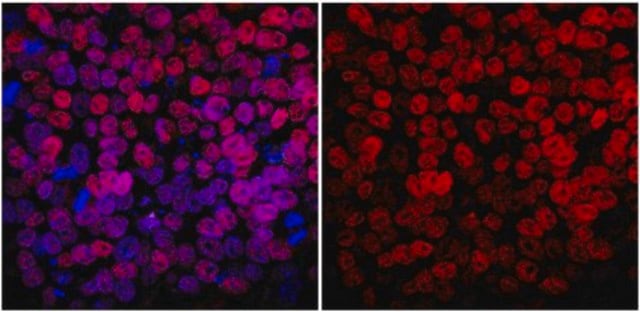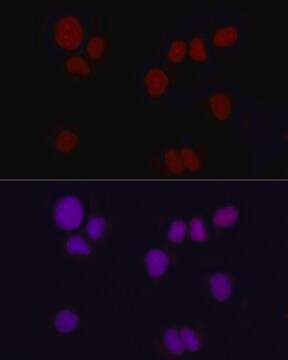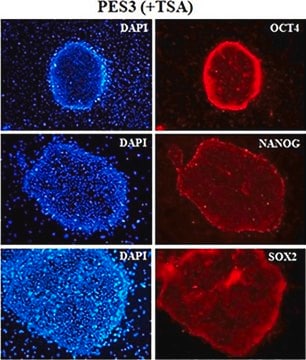P0082
Monoclonal Anti-POU5F1 (Oct4) antibody produced in mouse
~1.0 mg/mL, clone PF-29, purified immunoglobulin, buffered aqueous solution
Synonym(s):
Anti-OCT3, Anti-OCT4, Anti-OTF3, Anti-POU domain, class 5, transcription factor 1
About This Item
ICC
WB
indirect ELISA: suitable
western blot: 0.5-1 μg/mL using NT2/D1 total cell extract
Recommended Products
biological source
mouse
Quality Level
conjugate
unconjugated
antibody form
purified immunoglobulin
antibody product type
primary antibodies
clone
PF-29, monoclonal
form
buffered aqueous solution
mol wt
antigen ~43 kDa
species reactivity
human
concentration
~1.0 mg/mL
technique(s)
immunocytochemistry: suitable
indirect ELISA: suitable
western blot: 0.5-1 μg/mL using NT2/D1 total cell extract
UniProt accession no.
shipped in
dry ice
storage temp.
−20°C
target post-translational modification
unmodified
Gene Information
human ... POU5F1(5460)
General description
Specificity
Immunogen
Application
- immunoblotting
- immunocytochemistry
- enzyme-linked immunosorbent assay (ELISA)
Biochem/physiol Actions
Physical form
Storage and Stability
Disclaimer
Not finding the right product?
Try our Product Selector Tool.
recommended
related product
Storage Class Code
10 - Combustible liquids
Flash Point(F)
Not applicable
Flash Point(C)
Not applicable
Personal Protective Equipment
Choose from one of the most recent versions:
Certificates of Analysis (COA)
Don't see the Right Version?
If you require a particular version, you can look up a specific certificate by the Lot or Batch number.
Already Own This Product?
Find documentation for the products that you have recently purchased in the Document Library.
Articles
Quantitative and qualitative western blotting to validate knockdown by esiRNA.
Quantitative and qualitative western blotting to validate knockdown by esiRNA.
Quantitative and qualitative western blotting to validate knockdown by esiRNA.
Quantitative and qualitative western blotting to validate knockdown by esiRNA.
Our team of scientists has experience in all areas of research including Life Science, Material Science, Chemical Synthesis, Chromatography, Analytical and many others.
Contact Technical Service





![Anti-OCT-4 [POU5F1] Antibody, clone 7F9.2 clone 7F9.2, from mouse](/deepweb/assets/sigmaaldrich/product/images/307/874/7354f72d-80ee-40a5-b7fa-0590fe6784cc/640/7354f72d-80ee-40a5-b7fa-0590fe6784cc.jpg)


